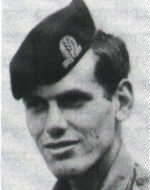Kandelstein, Eliezer (“Leizer”)
Son of Yehoshua and Bunia. He was born on 27.9.1948 in Kibbutz Mahanayim, at the height of the War of Independence, and was evacuated with the children of the kibbutz and a number of mothers to Haifa. Eliezer arrived in Givat Hashlosha in 1952 and studied there in elementary and high school. He was a member of the Hanoar Haoved movement and was a great basketball player. He loved nature and marveled at the landscape, the animal and the plant. He liked to take walks in nature and in general loved the best and most Yaffa of life and enjoyed reading poetry and listening to music. He was good-hearted and believed that man was basically good, so he would always come out to defend a friend who had sinned. He was a diligent and industrious student and did everything he was given seriously and responsibly. He was completely and uncompromisingly responsible for his studies, work, and even his military service. Eliezer was drafted into the IDF in May 1967. In his opinion, a good soldier is only a soldier who thinks about the nature of the order and fills it without criticism. He successfully completed a parachute training course and was an outstanding trainee. At the end of the course, each of the graduates received a training class. As a commander, he took care of his soldiers and tried to cultivate values in them and instill in them a fighting spirit, and even though his class would be the first in its achievements. His soldiers also sensed the greatness of their commander and called themselves “lasers.” In the Warrior Training chapter, he was careful to give his students a serious attitude towards their duty and to serve as a great example of self-discipline. He asked them to be meticulous in every detail and proved that he himself was doing the same. After completing the course he was also sent to an officers’ course. Even though he found his place in the army and adapted himself to his ranks, he dreamed of the day of liberation, in order to return to work in the field. He participated in dozens of operations in his life in the army, fought valiantly and succeeded in all of them. On the 11th of Iyar, 5729 (1.5.1969), about twelve hours after being wounded in the head by an enemy bombing in the Suez Canal area, he died of his wounds. He was laid to rest at the military cemetery on Givat Hashlosha. After his fall he was promoted to lieutenant. The commander of his unit wrote in a letter of condolence to his parents that when he moved him from the outpost to the helicopter, he was fully conscious and said, “I am strong, I am strong.” He relates that he recognized Eliezer’s special personality and wonderful qualities, and that he entered his unit with full vigor, full of initiative and willing to volunteer for any mission. During the period of his training in combat training, he discovered excellent qualities, and he stood out in his leadership and his unique views on how to improve the quality of his combat. The commander wrote that he had a special spirit of sacrifice, a sense that our army must be good and strong – and so he himself acted and thus strengthened his soldiers. The commander wrote: “I admired this young man – – – the whole period of his service was only looking for what to give more and more and more – – Your son Leyzer died a hero’s death, his chain of life in the unit was a long chain of anonymous acts of heroism, And to your estimation – – – Your Lazar and ours have fallen and are no longer, but is he not? Is that tall and innocent lad who lived in the shadow of the mission throughout his service and died on her knees, is he not? He lives with us and guides us, he is with us day and night, he and his ilk – the anonymous heroes of our unit – illuminate our paths day and night. ” In “Thirty” for his fall, Givat HaShlosha – Hakibbutz Hame’uchad published the “Hill Newsletter” as a violinist in his memory; In Nisan 5706, the book “In the Flower of the Lily” was published, commemorating his name.
